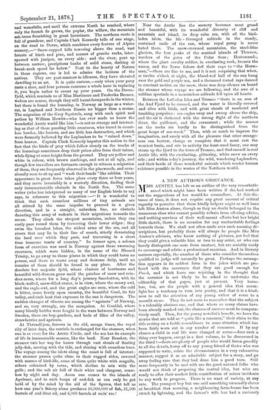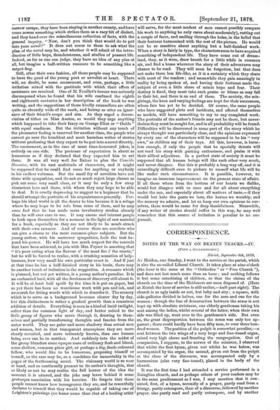A NEW AUTHOR'S GRIEVANCE.
MISS AUSTEN has left us an outline of the very remarkable novel which might have been written if she bad worked out the suggestions of her would-be counsellors. At this dis- tance of time, it does not require any great amount of critical sagacity to perceive that these kindly helpers might as well have left Miss Austen alone, though as they no doubt belonged to the numerous class who cannot possibly refrain from offering advice, and nothing survives of their well-meant efforts but her bright little sketch, there is no occasion for any uncharitable feelings towards them. We shall not often smile over such amusing de- scriptions, but probably there will always be people like Miss Austen's advisers, who know nothing of pictures, yet feel that they could give a valuable hint or two to any artist, or who can barely distinguish one note from another, but are amiably ready to encourage and advise a professional musician. And in literary matters especially, the number of those who consider themselves qualified to judge will naturally be great. Perhaps the assump- tion appears in its mildest form in the jokes which are pre- faced with the assurance that they are good enough for Punch, and which leave one rejoicing in the thought that the narrator is not likely to be asked to undertake the editorship of that paper, just at present. Very harm- less, too, are the people with a general idea that moon- light has a tendency to turn into poetry, and that it is a kind- ness to call the attention of any young writer of verse to a moonlit scene. They do not seem to remember that the subject is a tolerably obvious one, and that where so many claims have been already marked out, the chances of success must be compara- tively small. Then, for the young novelist's benefit, we have the stories that are told as " quite like a romance," their claim to the title resting on a feeble resemblance to some situation which has been fairly worn out in any number of romances. if by any chance a child in real life were changed at nurse—does such a thing ever happen, except in a first volume, to be discovered in the third ?—there are plenty of people who would listen greedily to all the details, hurry off to any young friend of theirs who was supposed to write, relate the circumstances in a very exhaustive manner, suggest it as an admirable subject for a story, and go away feeling sure that they had done him a good turn. Still more frequently to be met with are the good-natured folks who would not think of proposing the central idea, but who are ready to offer their modest little contribution of minor incidents to any work in progress. There is no want of variety, at any rate. The youngest boy but one said something unusually clever at breakfast that morning, a neighbouring farm-house has been struck by lightning, and the farmer's wife has had a curiously
narrow escape, they have been staying in another county, andhave come across something which strikes them as a racy bit of dialect, and they hand over the miscellaneous collection of facts, with the general inquiry, "Now, don't you think that would do to put into your novel?" It does not occur to them to ask what the plan of the novel may be, and whether it will admit of the intro- duction of little boys, thunderstorms, and studies of peasant life. Indeed, as far as one can judge, they have no idea of any plan at all, but imagine a half-written romance to be something like a carpet-bag.
Still, after their own fashion, all these people may be supposed to have the good of the young poet or novelist at heart. There will, no doubt, be some amusement, and even, perhaps, a little irritation mixed with the gratitude with which their offers of assistance are received. One of M. Feuillet's heroes was seriously discomposed when he found that his wife confused the eighth and eighteenth centuries in her description of the book he was writing, and the suggestions of these kindly counsellors are often quite as absurdly wide of the mark, and betray as utter an ignor- ance of their friend's scope and aim. As they urged a denun- ciation of tithes on Miss Austen, so would they urge anything which happened to take their fancy on George Eliot or " Ouida " with equal readiness. But the irritation without any touch of the pleasanter feeling is reserved for another class, the people who cannot go near the humblest and most harmless writer of stories without professing that they expect to be put into anovel directly. The amusement, as in the case of most time-honoured jokes, is entirely on one side. The pretence of expectation is about as humorous as if they declared that they expected him to eat them. It was all very well for Balzac to plan the Comedic Humaine, with its vast multitude of characters, and it might be supposed that he could find room for anything or anybody in his endless volumes. But the small fry of novelists have not these wide sympathies, and do not so much reject large classes as pick out some very small class, or it may be only a few stray characters here and there, with whom they may hope to be able to deal. It is cruelly depressing to suggest to a beginner that he should attempt the portraits of his acquaintances generally. Per- haps his ideal world is all the dearer to him because it is a refuge where he may hope to be safe from some of them, and he may even feel that he has made more involuntary studies already than he will ever care to use. It may amuse and interest people to look upon themselves for a moment in the light of raw material for a book, especially as they are not likely to be much struck with their own rawness. And of course there are novelists who can give a charm to the moat common-place subjects. But the young author, with his narrower sympathies, feels the task be- yond his power. He will have too much respect for the marvels that have been achieved, to join with Mrs. Poyaer in asserting that " it's poor eating when the flavour o' the meat lies i' the cruets," but he will be forced to realise, with a crushing sensation of help- lessness, how very small his own particular cruet is. And if just at that time he has a half-finished story in his brain, there may be another touch of irritation in the suggestion. A romance which is planned, but not yet written, is a young author's paradise. It is an enchanted land, with all the freshness of discovery still about it. It will be at least half spoilt by the time it is put on paper, but as yet there has been no wearisome work with pen and ink, and no search for fitting words with which to describe it. The scenery which is to serve as a background becomes clearer day by day, but this distinctness is rather a gradual growth than a conscious addition of details. Everything is seen in a kind of lucid twilight, softer than the common light of day, and better suited to the little group of figures who move through it, drawing to them- selves and partially transforming thoughts and fancies from the outer world. They are paler and more shadowy than actual men and women, but in that transparent atmosphere they are more clearly revealed, and more intimately known, than one human being ever can be to another. And suddenly into the midst of the group blunders some opaque mass of ordinary flesh and blood, some shallow, common-place girl, or perhaps a big, fresh-coloured fellow, who would like to be humorous, proposing himself or herself, as the case may be, as a candidate for immortality in the pages of the forthcoming novel. The visionary world is so near at hand, and so continually present to its author's thoughts, that as likely as not he may realise the full horror of the idea the moment it is uttered, and the joke may leave behind it some grotesque association with his heroine. He forgets that these people cannot know how incongruous they are, and he resentfully declares to himself that they would be capable of taking one of Leighton's paintings (no lesser name than that of a leading artist
will serve, for the most modest of men cannot possibly compare his work to anything he only cares about moderately), cutting out a couple of faces, and smiling through the holes, in the belief that their features harmonised with the rest of the picture. He would not be so sensitive about anything but a half-finished work. When a story is fairly in type, the characters seem to have acquired something of independent life. They have come out of dream- land, they, as it were, draw breath for a little while in common air, and find a home wherever the story of their adventures may chance to be read. They will soon be forgotten, but that does not make them less life-like, as it is a certainty which they share with moat of the readers ; and meanwhile they gain amazingly in reality by being spoken of, and having their fortunes made the subject of even a little share of mimic hope and fear. Their destiny is fixed, they must take such praise or blame as may fall to their lot, and there is an end of them. The anxiety, the mis- givings, the keen and varying feelings are kept for their successors, whose fate has yet to be decided. Of course, the same people who have suggested plots and incidents, and offered themselves as models, will have something to say to any completed work. The portraits of the author's friends may not be there, but never- theless they must be sought for, and in all probability will be found. Difficulties will be discovered in some part of the story which he always thought was particularly clear, and the opinions expressed by every one of the characters will be supposed to be his " very own," as children say of their toys. All this, however, is harm- less enough, if only the people that he specially detests will not read his story with gushing enthusiasm, and praise it with their silliest adjectives. In a perfect state of society it must be supposed that all human beings will like each other very much, and never disagree. But this is probably a long way off, and it is exceedingly difficult even to picture to oneself what life will be like under such circumstances. It is possible, however, to imagine an immense improvement on the present state of affairs. If all those whom from the bottom of our hearts we dislike, would but disagree with us once and for all about everything under the sun, and especially about all matters of taste,—if they would but hate the poets we love, the heroes we worship, and the scenery we admire, and let us keep our own opinions to our- selves, there would be cause for deep thankfulness. Meanwhile, if any writer of stories should suffer in this way, he may well remember that this source of irritation is peculiar to no one pursuit.































 Previous page
Previous page